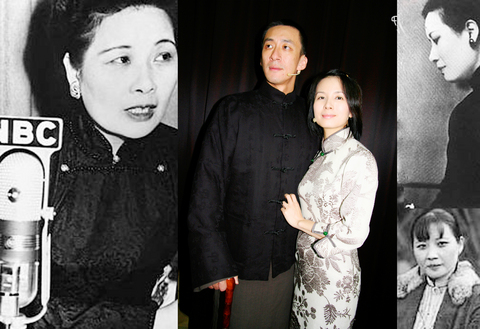If China's history over the past 100 years was a play then Soong Meiling (宋美齡) would be its leading lady, according to the writer and producer of a musical about the wife of Taiwan's former ruler Chiang Kai-shek (蔣介石).
Song of Love (世紀回眸) is not a direct translation of the Chinese title, but refers to an old expression (回眸一笑百媚生) that describes the action of a charming woman turning round with a smile and lighting up one's life.
As might be expected, therefore, the first dramatic rendition of Soong's life is a rose-tinted look at the woman who was a beauty, political heavyweight and the public face of China for many foreigners as the country came to prominence after World War II. Soong died peacefully in New York three years ago, aged 106.

PHOTO: JULES QUARTLY, TAIPEI TIMES
Melancholy Yang (楊忠衡) said he was inspired to pen a script about the former first lady's life story after visiting Shanghai, where she was born.
"It was three years ago and I found a store in the subway where there was a book about Soong with a lot of photos and articles I had never seen before. I was shaken and for some reason I thought this was the time to write about her. It was just before she died," Yang said, calling her, "China's prima donna."
"I would like to think this is an objective look at her life. It's not all good or bad, right or wrong, it's more a story, like Les Miserables. The politics is not so important as what happens and the feelings it creates."
At a dress rehearsal earlier this week Song of Love appeared to be an almost cinematic fast-forward through modern Chinese history. It skipped through Soong's childhood during the end of the Qing Dynasty, witnessed her wedding in 1927 and acknowledged her decisive role in the Xian Incident, when Chiang agreed to form an alliance with the Communists and fight Japan.
In the second act Soong represents China in the US, where she makes speeches in praise of democracy; accompanies Chiang in his flight to Taiwan after losing the civil war; and eventually leaves the political stage.
The musical ends on the theme of "I will rise again," which has multiple meanings, according to director Wang Yo-hui (王友輝). It could refer to Taiwan's progress, China's awakening from centuries of isolation and humiliation, even Soong's ascent to heaven or reincarnation.
At one point members of the cast dress up as Red Guards and sing the unofficial Chinese anthem The East Is Red (東方紅). This is a banned song in Taiwan and this will be the first time that it has been performed here, said Ran Tian-hao (冉天豪), who has written or arranged 30 songs for the production.
He said his influences were Giuseppi Verdi and Giacomo Puccini but he had researched music from Shanghai in the 1920s for Song of Love because it melded foreign and Chinese influences in a novel and effective manner.
"The Shanghai style was very poetic and in this case it was simple for the melodies to flow from the words," Ran said.
As for the acting, Hung Ruei-hsiang (洪瑞襄) was moved to tears at rehearsal on Monday night and this bodes well as she plays the main character from her teens up to her death as a centenarian. If she pulls it off on the night it will be an epic performance.

One of the biggest sore spots in Taiwan’s historical friendship with the US came in 1979 when US president Jimmy Carter broke off formal diplomatic relations with Taiwan’s Republic of China (ROC) government so that the US could establish relations with the People’s Republic of China (PRC). Taiwan’s derecognition came purely at China’s insistence, and the US took the deal. Retired American diplomat John Tkacik, who for almost decade surrounding that schism, from 1974 to 1982, worked in embassies in Taipei and Beijing and at the Taiwan Desk in Washington DC, recently argued in the Taipei Times that “President Carter’s derecognition

This year will go down in the history books. Taiwan faces enormous turmoil and uncertainty in the coming months. Which political parties are in a good position to handle big changes? All of the main parties are beset with challenges. Taking stock, this column examined the Taiwan People’s Party (TPP) (“Huang Kuo-chang’s choking the life out of the TPP,” May 28, page 12), the Democratic Progressive Party (DPP) (“Challenges amid choppy waters for the DPP,” June 14, page 12) and the Chinese Nationalist Party (KMT) (“KMT struggles to seize opportunities as ‘interesting times’ loom,” June 20, page 11). Times like these can

Dr. Y. Tony Yang, Associate Dean of Health Policy and Population Science at George Washington University, argued last week in a piece for the Taipei Times about former president Ma Ying-jeou (馬英九) leading a student delegation to the People’s Republic of China (PRC) that, “The real question is not whether Ma’s visit helps or hurts Taiwan — it is why Taiwan lacks a sophisticated, multi-track approach to one of the most complex geopolitical relationships in the world” (“Ma’s Visit, DPP’s Blind Spot,” June 18, page 8). Yang contends that the Democratic Progressive Party (DPP) has a blind spot: “By treating any

You can tell a lot about a generation from the contents of their cool box: nowadays the barbecue ice bucket is likely to be filled with hard seltzers, non-alcoholic beers and fluorescent BuzzBallz — a particular favorite among Gen Z. Two decades ago, it was WKD, Bacardi Breezers and the odd Smirnoff Ice bobbing in a puddle of melted ice. And while nostalgia may have brought back some alcopops, the new wave of ready-to-drink (RTD) options look and taste noticeably different. It is not just the drinks that have changed, but drinking habits too, driven in part by more health-conscious consumers and